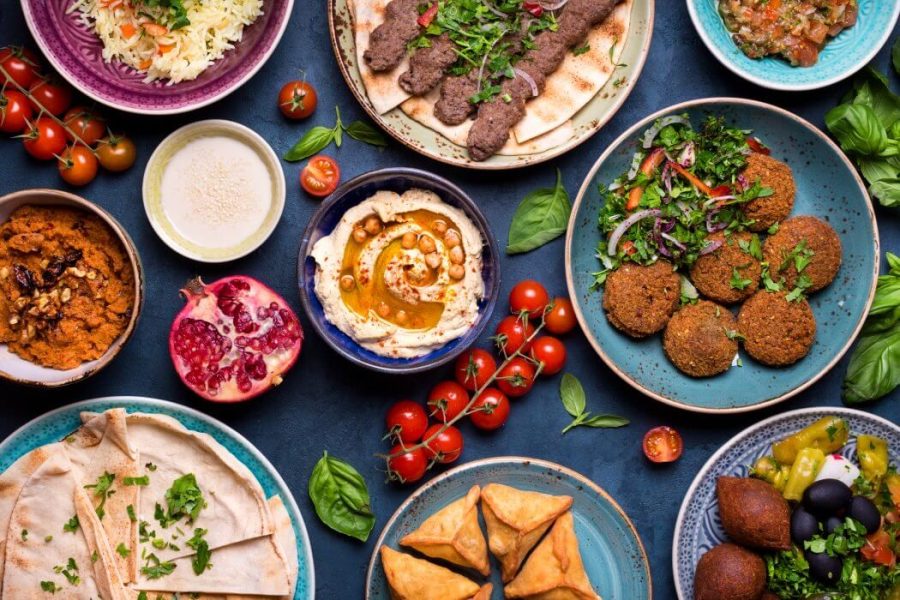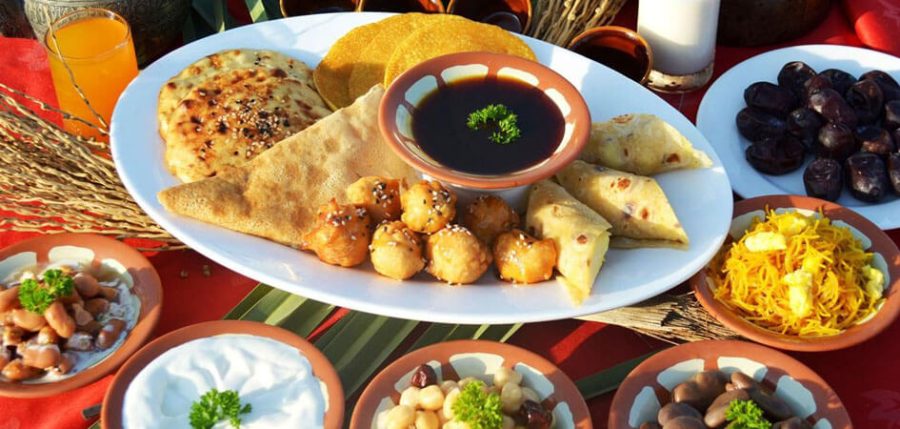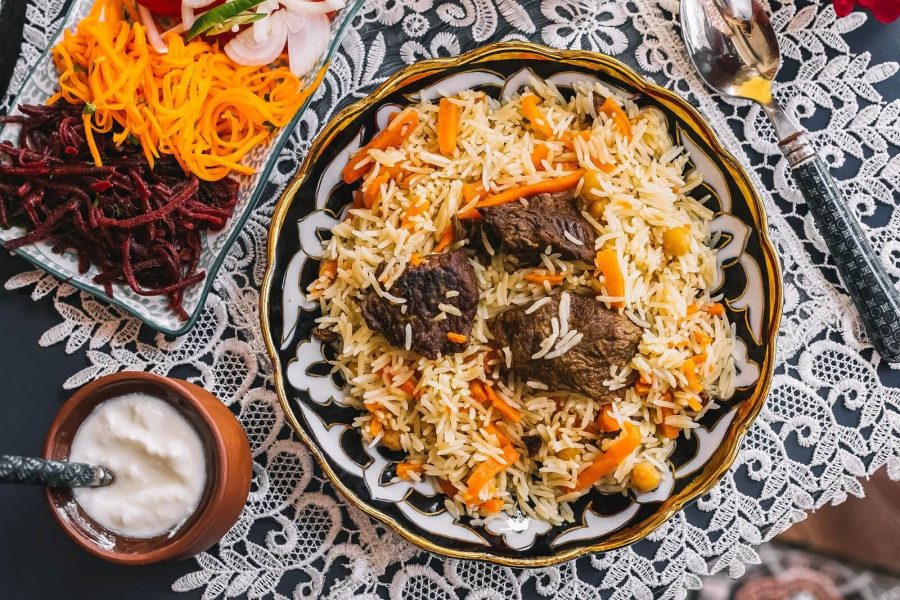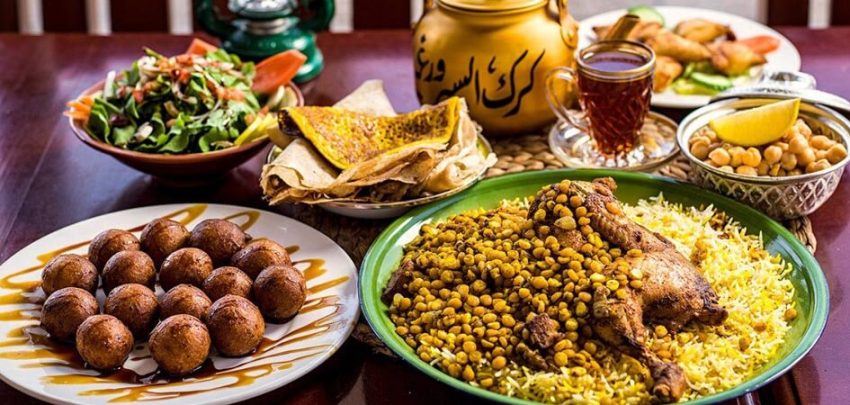Introduction to Emirati Cuisine
In the heart of the United Arab Emirates (UAE), Dubai is a beacon of luxury, culture, and innovation. Amidst its towering skyscrapers and luxurious lifestyle, Dubai harbors a rich culinary heritage that often goes unnoticed by many. Emirati cuisine, deeply rooted in the country’s history and traditions, offers a unique glimpse into the UAE’s cultural identity. This article delves into the essence of traditional Emirati meals, their cultural significance, and the best restaurants where one can savor these authentic flavors.
Historical Background of Emirati Cuisine
Emirati cuisine reflects the UAE’s rich cultural heritage, influenced by its history, climate, and trade interactions. The traditional diet of the Emiratis has been shaped by the Bedouin lifestyle, coastal resources, and agricultural practices. Common ingredients include rice, meat (primarily lamb, goat, and chicken), fish, dates, and various spices such as saffron, cardamom, and turmeric.

Cultural Significance of Emirati Meals
In the Arabian Peninsula, food is more than sustenance; it symbolizes hospitality and community. Traditional Emirati meals, known for their generous portions and rich flavors, are often served during family gatherings, festivals, and special occasions. The preparation and sharing of these meals embody the values of generosity, respect, and unity central to Emirati culture.
Key Traditional Emirati Dishes
Al Harees
Al Harees is a quintessential Emirati dish, particularly enjoyed during Ramadan and other festive occasions. This slow-cooked dish is made from wheat and meat, usually lamb or chicken, seasoned with salt. The ingredients are cooked in a clay pot for several hours until they reach a porridge-like consistency. The result is a comforting, hearty meal that reflects the simplicity and depth of traditional Emirati cooking.
Machboos
Machboos, similar to biryani, is a spiced rice dish cooked with meat, onions, and a blend of spices such as turmeric, cinnamon, and cardamom. Dried limes (loomi) are often added for a distinctive tangy flavor. This dish is a staple in Emirati households and is usually served during large gatherings and celebrations.
Balaleet
Balaleet is a popular Emirati breakfast dish consisting of sweetened vermicelli noodles flavored with saffron and cardamom, served with an omelet on top. Combining sweet and savory elements makes it a unique and delightful breakfast option, highlighting the creative use of spices in Emirati cuisine.
Al Madrooba
Al Madrooba is a savory fish stew thickened with flour and seasoned with spices, typically enjoyed during Ramadan. The dish is known for its rich, creamy texture and robust flavors, making it a favorite comfort food among Emiratis.
Luqaimat
Luqaimat are sweet dumplings made from flour and yeast. They are deep-fried until golden brown and drizzled with date syrup or honey. These bite-sized treats are commonly served during festivals and special occasions, offering a sweet conclusion to a traditional Emirati meal.
Popular Restaurants Offering Traditional Emirati Cuisine
Al Fanar Restaurant & Café
For an authentic Emirati dining experience, Al Fanar Restaurant & Café stands out as one of the best restaurants in Dubai. With locations in Dubai Festival City and other parts of the UAE, Al Fanar offers a menu that includes traditional dishes like Al Harees, Machboos, and Luqaimat. The restaurant’s decor reflects a nostalgic Emirati village setting with historical artifacts and conventional seating arrangements.
SMCCU (Sheikh Mohammed Centre for Cultural Understanding)
The Sheikh Mohammed Centre for Cultural Understanding provides cultural dining experiences, including traditional Emirati meals in a traditional courtyard. The center offers insights into Emirati customs and traditions, making it an educational and culinary expertise. Guests can enjoy dishes like Al Madrooba and Machboos while learning about the significance of these meals in Emirati culture.
Seven Sands
Located in Jumeirah Beach Residence (JBR), Seven Sands serves a range of Emirati dishes, highlighting the culinary heritage of the seven Emirates. The restaurant’s menu includes Al Madrooba, Balaleet, and Machboos, among other traditional delicacies. Seven Sands is known for its elegant setting and attention to detail, making it a top choice for those seeking an immersive Emirati dining experience.
Aseelah
Situated in Radisson Blu Deira Creek, Aseelah blends traditional Emirati flavors with contemporary presentation. Signature dishes include Al Harees and Machboos, served in a sophisticated environment that pays homage to Dubai’s rich cultural heritage. The restaurant’s commitment to authenticity and quality makes it one of the best places to experience Emirati cuisine in a refined setting. Visit Aseelah for details.

Cultural and Community Events
Dubai Food Festival
The Dubai Food Festival is an annual event that showcases the diversity of Dubai’s culinary scene, including traditional Emirati cuisine. Visitors can sample various dishes and learn about the UAE’s culinary traditions. The festival includes cooking demonstrations, food tours, and dining experiences that highlight the rich flavors and techniques of Emirati cooking. For more information, visit the Dubai Food Festival.
Global Village
Global Village is a multicultural festival park with pavilions worldwide, including an Emirati pavilion where visitors can enjoy traditional dishes and cultural performances. This event provides an opportunity to experience the global influences on Emirati cuisine and the vibrant cultural diversity of Dubai. Learn more at Global Village.
Traditional Emirati Dining Experiences
Desert Safaris
Many desert safari tours include traditional Emirati meals served in a Bedouin-style camp, offering dishes like Al Harees, Machboos, and grilled meats. These experiences often feature cultural performances such as belly dancing and Tanoura shows, providing a comprehensive insight into Emirati heritage.
Cultural Meals at Heritage Sites
Some heritage sites, like the Al Fahidi Historic District, offer dining experiences where guests can enjoy traditional meals in a historical setting. These events often include storytelling and cultural activities, enhancing the authenticity of the experience. For more information, visit the Dubai Culture website.
Learning and Cooking Classes
Emirati Cooking Classes
Several culinary schools and cultural centers in Dubai offer cooking classes where participants can learn to prepare traditional Emirati dishes. These classes provide hands-on experience with local ingredients and techniques, making them educational and enjoyable.
SMCCU Workshops
The Sheikh Mohammed Centre for Cultural Understanding offers workshops and classes that teach participants how to cook traditional Emirati meals. These sessions provide a deeper understanding of the cultural significance behind the dishes and the culinary traditions of the UAE. More details can be found at SMCCU.
The Best Restaurants Featuring Emirati Cuisine
Emirati cuisine is not just limited to dedicated traditional restaurants; many contemporary dining establishments incorporate Emirati flavors into their menus, offering a fusion of the old and the new. Some of the best restaurants in Dubai that feature Emirati dishes include:
Arabian Tea House
Arabian Tea House is located in the Al Fahidi Historic District and offers a charming setting in which to enjoy traditional Emirati meals. The menu includes classics like Machboos and Al Harees, served in a relaxed, garden-like atmosphere. This restaurant is a perfect spot to experience historical ambiance and authentic flavors.
Logma
Logma, located in Boxpark and The Dubai Mall, offers a modern twist on traditional Emirati and Khaleeji dishes. The menu features a variety of savory and sweet options, including Balaleet and Luqaimat. Logma’s contemporary decor and casual dining experience make it popular among locals and tourists.

Health and Sustainability Trends in Emirati Cuisine
Organic and Local Ingredients
Emirati cuisine is increasingly using organic and locally sourced ingredients. Restaurants like Baker & Spice emphasize farm-to-table practices, ensuring that the ingredients used are fresh, sustainable, and ethically sourced. This trend reflects a broader global movement towards healthier and more environmentally conscious dining options.
Eco-Friendly Practices
Many street food vendors and traditional restaurants are adopting eco-friendly practices, such as biodegradable packaging and reducing food waste. Initiatives like Dubai Sustainable Tourism promote sustainable practices within the hospitality industry, encouraging restaurants to minimize their environmental impact.
Conclusion
Traditional Emirati meals offer a delicious and insightful way to experience the rich cultural heritage of the UAE. From the comforting flavors of Al Harees to the sweet delights of Luqaimat, each dish tells a story of the region’s history and traditions, whether dining at a dedicated traditional restaurant, participating in a cultural event, or learning to cook the dishes yourself, exploring Emirati cuisine is a rewarding journey into the heart of the UAE’s traditions and hospitality.
For anyone visiting Dubai, seeking the best restaurants serving authentic Emirati cuisine is a must. These establishments taste the region’s culinary heritage and connect deeply to the culture and community. As Dubai continues to evolve as a global culinary hub, preserving and celebrating its traditional cuisine remains a vital part of its cultural identity.

Here you’ll find thoughts on lifestyle, digital work, side-projects, and staying grounded in a fast-paced city.

